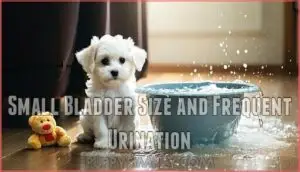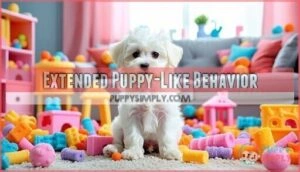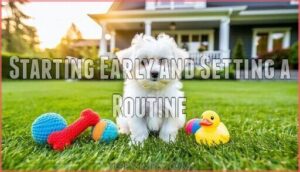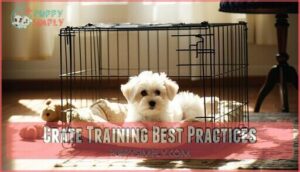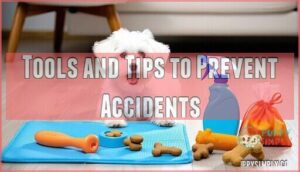This site is supported by our readers. We may earn a commission, at no cost to you, if you purchase through links.
 Bichons are moderately hard to potty train—not impossible, but they’ll test your patience more than most breeds. Their small bladders mean frequent trips outside, and their stubborn streak can make consistency feel like an uphill battle.
Bichons are moderately hard to potty train—not impossible, but they’ll test your patience more than most breeds. Their small bladders mean frequent trips outside, and their stubborn streak can make consistency feel like an uphill battle.
Weather-shy by nature, many Bichons flat-out refuse to potty in rain or snow, turning every drizzle into a negotiation. Add separation anxiety and you’ve got a recipe for indoor accidents.
The good news? With the right approach and realistic expectations, you can absolutely succeed. Understanding what makes Bichons tick—and why they struggle—turns frustration into a manageable training plan.
Table Of Contents
- Key Takeaways
- Are Bichons Hard to Potty Train?
- Why Bichons Struggle With Housebreaking
- Proven Potty Training Strategies for Bichons
- Tools and Tips to Prevent Accidents
- Overcoming Setbacks and Maintaining Progress
- Frequently Asked Questions (FAQs)
- How long should I expect potty training my Bichon to take?
- What are some signs my Bichon needs to go potty?
- Should I use puppy pads or take my Bichon outside?
- What should I do if my Bichon has an accident inside?
- Can Bichons be trained to use pee pads?
- What health issues mimic potty training problems?
- How does diet affect Bichon bladder control?
- Are male or female Bichons easier to train?
- Can older rescue Bichons learn potty training?
- Conclusion
Key Takeaways
- Bichons take four to six months to potty train on average due to small bladders, stubborn temperament, and weather sensitivity, making them moderately challenging compared to other breeds. – Consistency matters most—taking your Bichon to the same outdoor spot at scheduled times after meals, naps, and play builds reliable habits faster than any other strategy. – Positive reinforcement within seconds of successful elimination creates lasting results, while punishment confuses dogs and slows progress since they can’t connect discipline to past actions. – Professional help becomes necessary if accidents continue past six months, multiple training methods fail, or anxiety and behavioral issues complicate the housebreaking process.
Are Bichons Hard to Potty Train?
Bichons can be stubborn about potty training—some pick it up fast, others take months. A few things will make or break your success here.
Let’s break down what makes this process tricky and what factors actually determine your success.
Typical Potty Training Challenges
When you’re potty training a Bichon Frise, you’ll face some hurdles that catch many new owners off guard. Inconsistent signals from your puppy make it tough to know when they need to go.
Bladder control takes longer to develop in Bichons, leading to frequent accidents. Separation anxiety can trigger marking behavior indoors, and weather impact matters too—many Bichons refuse to potty outside during rain or snow.
Comparison to Other Small Breeds
Bichon Frises land somewhere in the middle regarding housebreaking success rates among small dog breeds. Only 67% of dogs under 20 lbs achieve complete house-training, compared to 95% for larger breeds.
Miniature Poodles and Havanese often outpace Bichons in training timelines, while Beagles and Dachshunds usually take even longer. Your Bichon’s independent temperament plays a role—they’re smart but less eager-to-please than some toy breeds, which can stretch the process to six months or more.
New pet owners should know that potty training is essential for teaching dogs to eliminate outside.
Factors That Affect Success
Potty training a Bichon? It’s not just about the breed. Your daily routine, where you live, and how you approach training all play a big role. Here’s what actually matters:
- Training Consistency—Taking your Bichon out at the same times daily builds reliable bathroom habits.
- Early Socialization—Starting potty training at 8 to 12 weeks sets your Bichon Frise up for success.
- Health Conditions—Urinary tract issues can cause frequent accidents despite your best efforts.
- Environmental Factors—Weather and outdoor access affect your dog’s behavior and willingness to go outside.
- Breed-Specific Traits—Your Bichon’s independent streak requires extra patience during potty training challenges.
Why Bichons Struggle With Housebreaking
Bichons aren’t impossible to potty train, but they do face some real challenges that can slow the process down.
Let’s look at the main reasons these little dogs struggle with housebreaking.
Small Bladder Size and Frequent Urination
Here’s something that trips up a lot of Bichon owners: these little dogs need bathroom breaks way more often than big breeds. Their bladders are only about the size of a golf ball, and they process water quickly, so they just can’t hold it as long. That’s why housetraining can feel like an uphill battle.
How much your Bichon eats matters too. Active dogs drink more water, which means more trips outside to keep their bladder healthy.
| Weight Range | Daily Calories | Potty Break Frequency |
|---|---|---|
| Active Bichon | 404-663 | Every 2-3 hours |
| Elderly Bichon | 296-495 | Every 3-4 hours |
| Puppy (8-12 weeks) | Varies | Every 1-2 hours |
Keep an eye out for signs of a urinary tract infection—things like squatting over and over or whining when they pee. Bichons are more prone to bladder problems, so managing their diet helps with bladder control and cuts down on indoor accidents.
Extended Puppy-Like Behavior
While most puppies mature out of their playful antics by 12 months, Bichons often hold onto their puppy-like behavior well into their second or even third year—and that includes inconsistent potty habits.
This delayed maturity means your Bichon Frise might experience behavioral regression or incomplete housebreaking long after you’d expect a puppy to be fully trained. Their lingering puppyhood can lead to unexpected accidents, even when you think you’ve made progress.
Stubbornness and Anxiety Issues
What’s behind these issues?
Here’s what drives these behavioral concerns:
- Stubborn resistance during bad weather or when they sense inconsistent rules
- Anxiety-driven accidents when left alone, affecting up to 57% of anxious Bichons
- Stress responses to routine changes, causing a 37% spike in accidents within 48 hours
The good news? Positive reinforcement boosts compliance by 63%, and early intervention can increase reliable potty habits by 70% within three months. Establishing a consistent potty routine is essential for successful training.
Proven Potty Training Strategies for Bichons
Training a Bichon works best when you know what motivates them and stick with it.
Training a Bichon doesn’t have to feel like an uphill battle if you use the right approach.
Here are four proven strategies that’ll help you build good habits and set your pup up for success.
Starting Early and Setting a Routine
You need to start potty training the day your Bichon puppy comes home. Waiting even a few weeks lets bad habits take root. Between 8 and 12 weeks old is the sweet spot to begin—stick to a schedule and take your pup to the same spot after meals, naps, and playtime.
Reward them right away when they go in the correct place. That instant feedback helps them understand what you want. Consistency is everything here—it’s what turns those early wins into automatic behavior.
| Time of Day | Potty Break Schedule |
|---|---|
| Morning | Immediately after waking up |
| After Meals | Within 15-30 minutes of eating |
| After Play | Right after active play sessions |
| Before Bed | Last outing before sleep |
| Before Bed | Last outing before sleep |
Positive Reinforcement Techniques
Rewarding your Bichon at the exact moment they finish going potty outside is like hitting the jackpot—it’s the difference between a dog who gets it and one who’s still guessing what you want.
Treat timing matters most, so keep treats in your pocket and deliver them within seconds. Verbal praise like "good potty" adds to the reward variety your Bichon craves.
This positive reinforcement approach shapes behavior without the confusion that punishment creates, making puppy training smoother for both of you.
Crate Training Best Practices
Think of crate training as giving your Bichon their own little bedroom—a safe spot where they naturally learn to hold it.
Go for a crate sized just right: enough room to stand and spin around, but not so roomy they’ll pee in one corner and sleep in another.
Crate training isn’t about locking your Bichon up—it’s about giving them a cozy den where holding their bladder becomes second nature. Choose a crate that’s just big enough for your puppy to stand and turn around—too much space invites accidents.
Introduce it gradually with treats and toys, then stick to scheduled crate time after meals and naps. This housebreaking method works because Bichons won’t soil their sleeping area, turning the crate into your most reliable potty training ally.
Using Designated Outdoor Spots
Your Bichon won’t magically know where to go unless you show them the exact same spot every single time—think of it as their outdoor bathroom that needs a clear address. Here’s how to make it work:
- Scent marking builds consistency – Dogs remember where they’ve gone before
- Surface preference matters – Stick to grass or gravel, not switching between concrete and mulch
- Weather impact requires patience – Rain or snow might slow potty breaks, but stay committed
- Spot maintenance prevents confusion – Keep the area clean for housebreaking success
- Odor control aids potty training your Bichon Frise – Use enzyme cleaners to manage smells without erasing scent cues
Tools and Tips to Prevent Accidents
Preventing accidents isn’t just about watching your Bichon—it’s about setting up your space the right way.
Here are a few practical tools and strategies that’ll help you stay one step ahead.
Gradually Increasing Freedom
Once your Bichon proves reliable in a smaller space, you can start opening up more rooms—but don’t rush it. Add one room at a time, keeping supervision duration short at first.
Watch for signs they need to go, and maintain those indoor boundaries until trust building is solid. If accidents happen, scale back and reinforce housebreaking basics before offering more off-leash privileges.
Your puppy earns freedom through consistency.
Confinement When Unsupervised
When you can’t watch your Bichon, think of a crate or playpen as a safety zone, not a timeout. It keeps your puppy secure and your floors accident-free.
When you can’t keep an eye on your Bichon, confinement isn’t punishment—it’s prevention. A crate or playpen gives your puppy a safe space while preventing accidents around the house.
Dogs naturally avoid soiling their sleeping area, so crate training methods work with their instincts. Start with short periods and gradually build up supervised freedom as housebreaking improves.
BlueTree Dog Doorbells for Potty Training
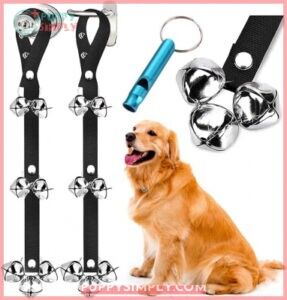
Teaching your Bichon to ring a bell when they need to go outside can save you from constant guessing games and scratched-up doors. The BlueTree Dog Doorbells make this simple with their adjustable length and clear jingle sound.
Here’s why potty bells work for Bichon Frise housebreaking:
- Clear communication – Your dog signals potty breaks without barking or scratching
- Three-step training process – Easy to teach even stubborn Bichons
- Durable construction – Heavy-duty nylon and metal bells withstand daily use
- Affordable solution – At $9.99, it’s a budget-friendly training aid
Overcoming Setbacks and Maintaining Progress
Accidents will happen, no matter how solid your plan is. When they do, don’t panic—just adjust and move forward. Here’s what to do when your Bichon has a slip-up.
Even with the best training plan, setbacks happen—and that’s completely normal. Here’s how to handle bumps in the road and keep your Bichon on track toward reliable potty habits.
Handling Accidents Properly
Accidents aren’t a sign of failure—they’re just part of the learning curve every Bichon (and owner) has to navigate. When potty mishaps happen, skip the scolding. Your dog won’t connect punishment with what happened minutes ago.
Instead, clean the spot thoroughly with an enzyme cleaner to eliminate urine odor—this prevents your Bichon from returning to the same spot. Focus on consistent rewards and positive reinforcement when your dog gets it right outdoors.
Adjusting Routines as Needed
As your Bichon grows and adapts, you’ll need to tweak your schedule to match their changing bladder control and daily habits. Here’s how to stay flexible:
- Watch for progress signals—fewer accidents mean you can stretch time between potty breaks
- Adjust after environmental changes—moving homes or new family members can temporarily disrupt potty training your Bichon Frise
- Maintain owner consistency even when schedules shift—your Bichon thrives on predictable patterns
- Track puppy adaptation phases—growth spurts and teething can affect bladder control and trigger setbacks
Staying flexible with your routine keeps training on track as your dog grows up.
Routine flexibility keeps potty training strategies effective as your dog matures.
When to Seek Professional Training Help
Sometimes, despite your best efforts, potty training challenges persist—and that’s when professional guidance becomes essential. If your Bichon still has frequent accidents after six months, you’ve tried multiple methods without success, or behavioral issues like anxiety accompany the soiling, it’s time for expert intervention. Before investing in dog training, get medical clearance from your vet to rule out health problems. An online dog training course or certified trainer using positive reinforcement can transform your dog’s behavior and training outcomes when DIY approaches fall short.
| Sign You Need Help | What It Means | Next Step |
|---|---|---|
| Accidents after 6+ months | Bladder control should be established | Consult a professional trainer |
| Multiple failed methods | Confusion from inconsistent approaches | Seek structured expert guidance |
| Behavioral problems present | Anxiety or stubbornness complicating progress | Consider thorough behavior assessment |
Maintaining Consistency and Patience
Potty training isn’t about being perfect. It’s about consistency—sticking with the same routine every single day, even when it feels like you’re getting nowhere.
Scheduling bathroom breaks at regular times and rewarding good behavior are what actually work. When you stay patient and keep your approach steady, you create the kind of calm environment where puppies start to get it. The positive reinforcement clicks because they know what to expect.
The techniques themselves only work if you trust them and notice the small victories as they happen.
Dog training techniques work best when you trust the process and celebrate small wins along the way.
Frequently Asked Questions (FAQs)
How long should I expect potty training my Bichon to take?
Imagine this: your Bichon puppy finally gets it on week sixteen, and you breathe a sigh of relief.
Most Bichon Frise puppies need four to six months of consistent potty training before they’re reliably housebroken, though some catch on faster with dedicated schedules and positive reinforcement throughout puppy development.
What are some signs my Bichon needs to go potty?
Your Bichon will show clear potty signals through body language and behavior. Watch for sniffing behavior, circling, whining signs, or heading toward the door.
Understanding these elimination habits makes potty training your Bichon Frise smoother and helps prevent accidents indoors.
Should I use puppy pads or take my Bichon outside?
Puppy pads might seem easier at first, but they actually create more work down the road. Teaching your Bichon to go outside from the start builds the habit you actually want.
Outdoor scheduling shows them where they should really be doing their business. Pad training can confuse housebreaking because you’ll eventually need to retrain them to go outside anyway.
Yes, weather can be a pain, but sticking to one method matters way more for getting your dog potty trained.
Weather considerations matter, but consistency matters more for successful dog potty training.
What should I do if my Bichon has an accident inside?
When accidents happen during potty training your Bichon Frise, stay calm and skip the scolding.
Clean thoroughly with an enzyme cleaner to eliminate urine odor removal issues—this prevents repeat housebreaking mistakes in the same spot.
Then refocus on your routine.
Can Bichons be trained to use pee pads?
Yes, you can train your Bichon Frise to use pee pads as an indoor solution.
Pad placement strategies and consistent positive reinforcement make pee pad training effective for puppy housebreaking and accidents prevention.
What health issues mimic potty training problems?
Several medical conditions can look like behavioral accidents. Urinary tract infections cause urgent, frequent trips outside. Bladder stones and kidney disease also lead to unpredictable elimination.
Dietary sensitivities may trigger sudden bowel issues, making your Bichon Frise’s behavior seem like a potty training problem when it’s actually a dog health concern.
How does diet affect Bichon bladder control?
What you feed your Bichon directly impacts Bladder Health and Urinary Frequency. Poor Dietary Management can trigger accidents during potty training your Bichon Frise.
Proper Caloric Intake and Hydration Levels promote better bladder control, reducing urinary tract infection risks in your dog training journey.
Are male or female Bichons easier to train?
Regarding potty training your Bichon Frise, gender differences don’t really matter much.
Training methods and positive reinforcement training work equally well for both males and females, though individual personality trumps gender every time.
Can older rescue Bichons learn potty training?
Adult Bichon Frises can definitely learn potty training—it just takes patience and consistency. The "old dog, new tricks" saying doesn’t really hold up here.
Can teaching an old dog new tricks really work? Absolutely. Adult Bichon Frises can learn potty training with patience and consistency.
Senior Dog Housebreaking and Adult Dog Training use positive reinforcement and routines.
Rescue Potty Tips include frequent breaks, Potty Refresher Courses, and Older Bichon Care strategies that build trust gradually.
Conclusion
Sure, Bichons demand more effort than some breeds—but that doesn’t mean you’re stuck with a dog who never learns. Are Bichons hard to potty train? Yes, but patience and the right tools turn challenges into wins.
Stick with your routine, celebrate small victories, and don’t let setbacks shake your confidence. Your Bichon can master housebreaking—you just need consistency, realistic expectations, and a willingness to adapt when things don’t go perfectly.
- https://www.pawtracks.com/dogs/bichon-frise-potty-training/
- https://iheartdogs.com/how-often-do-i-take-a-bichon-frise-outside-to-pee/
- https://www.reddit.com/r/puppy101/comments/xb4zab/small_dogs_are_harder_to_potty_train/
- https://www.dogster.com/dog-training/how-to-train-a-bichon-frise
- https://articles.hepper.com/how-to-train-a-bichon-frise/

